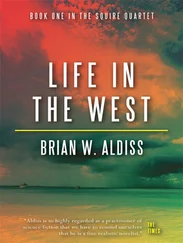Kaginovich slapped his thigh under the table and said, ‘We undergo a war for our survival. I regard this directive as an imposition. We have no time to worry about old churches.’ He launched into a lecture in which the word ‘liberty’ figured largely.
Burnell broke in. ‘I shall leave at once if you are unable to cooperate. Let me remind you that if WACH means little to you, Captain Kaginovich, I come under the command of General Augustus Stalinbrass of the EU Security Forces, who takes a personal interest in my mission.’
Irving did not so much as blink an eye at this claim. Kaginovich stood up. He summoned a nearby guard, who came hastily forward. ‘Dr Burnell, maybe you are a stranger to war. I will show you the reality of war in our region. You shall see how hostilities are conducted.’
He marched off with the guard, to leave the building by a side door.
As Burnell well knew, ‘Gus’ Stalinbrass cared little more for religion and culture than did the ambitious Kaginovich. Nevertheless, the Church of Ghvtismshobeli had notched up notably longer staying power than the General; indeed, it had outlasted what had been until recent years the Socialist Republic of Georgia. For all its inefficiency, WACH had exerted pressure through Washington. As Burnell waited to board his flight at FAM airport, he had received a letter of authorization and support from Stalinbrass’s command. Of the hidden agenda regarding the ikon, nothing was said, but Burnell did not doubt that ‘Number One’ was involved.
Burnell had flown from FAM to Israel by Lufthansa, and from Israel to Tbilisi by a military jet. Irving had met him in Tbilisi. From Tbilisi to Kaginovich’s temporary headquarters had been a hundred-and-fifty-kilometre hop. In truth, Kaginovich’s so-called revolution was little but a guerrilla movement. A dozen small cities, of which Bogdanakhi was the largest, had fallen to Kaginovich. The supplies they had brought him in the Yak were deflected from Ethiopia.
Impatient with Kaginovich’s abrupt departure, Burnell rose and walked about. Jim Irving sat tight. ‘Looks like we’re going to have a floor show to test our nerves,’ he said.
Abstract patterns formed from Arabic scripts had once adorned the walls of the old mosque. They had been largely obliterated by fire and graffiti. Kicking about in some ashes near the mihrab, the niche on the mosque’s Mecca-facing wall, Burnell came on fragments of unburnt polished wood. The mimbar, the high pulpit, had evidently been used to warm Kaginovich’s troops on cold nights. The captain had put religion to practical use.
Harsh shouts sounded, screams, curses. A number of guards entered the mosque, bringing with them two prisoners at gunpoint. The prisoners were mere lads, dirty, ragged, wild. Both looked sick with terror. They stumbled as they came.
Kaginovich followed, looking grimly pleased. Directed by a sergeant, the West Georgian guards thrust their captives against a wall of the mosque. Kaginovich issued an order. The soldiery all round sat up and took notice, or stood silently.
The sergeant produced a bowie knife, severing the belt of the older of the prisoners. The man’s cord breeches were dragged down, to reveal to all that he had shat himself with fright.
Irving calmly surveyed the scene. He strolled round the desk and sat down in Kaginovich’s chair, hitching a leg up on the desk. Taking his cue, Burnell sat down too, folding his arms tightly together to put himself in an imaginary straitjacket.
Another order from Kaginovich. The sergeant now threw himself at the other prisoner, the younger of the two. The guards held the lad, dragging his arms behind his back. Terrible cries rang out as the lad’s face was carved into. Burnell could bear neither to watch nor turn away. One of the lad’s eyes was gouged out. It fell to the floor.
The sergeant wiped his bloodied hands on the prisoner’s shirt. The prisoner collapsed in the straw and dirt, trapping his mutilated face between hands and knees. His companion, unwilling witness to this cruelty, had turned a frightful colour. Sweat poured down his unshaven face. He began to babble. Possibly he was praying. His body shook so badly it needed four men to hold him still. The severed eye was picked up and rammed into his mouth. He was beaten about his head until he swallowed it.
Both prisoners were then shot from behind. As their bodies were dragged away, hounds sprang forward and quizzed at the trails of blood and slime.
Kaginovich rubbed his hands with a washing movement. He said to Burnell, ‘Warfare is serious business. All that and more we shall do to their wives and sisters when we get them.’
The whole contingent was due to move towards the town of Bogdanakhi at dawn. Burnell and Irving were given rope beds to sleep on in a barrack near the mosque. Each carried space blankets to protect them from the cold of night.
Greatly though he longed for sleep, Burnell remained on a rocky shore of wakefulness. The scene in the mosque kept returning like a malignant bluebottle. It would not leave him. The pain of the young prisoners seemed drawn on his retina in white lines. Sickly, he crept at last into the open, to stand under the stars and gulp in the night air like a man diseased.
After a while, he saw Irving was standing nearby, a dark thin figure with hunched shoulders. The aroma of his cigarette reached Burnell.
‘It’ll be a long way to Ghvtismshobeli at this rate,’ said Burnell. ‘And with this company.’
Irving spoke in a nonchalant morning voice. ‘We may come up against worse sights yet. Those executions were not designed to impress us two alone. They were aimed also at Kaginovich’s officers. Loyalty here is reinforced by cruelty.’
‘Hard to see why anyone should be loyal to that monster.’
‘Kaginovich is a renegade from the Georgian National Guard, where he was cordially hated. His men probably hate him too, but they fight for a land they love. Kaginovich’s nickname, incidentally, is “The Dead One”.’
‘Not very apt, I’d have thought.’
‘Nope? Believe me, Roy, it’s bang on target. I’ll tell you the tale one day. We’d better sleep now. Dawn’s not far off and it’ll be a tough day ahead.’
They returned to their beds. Irving faced the wall. A slight mutter came from him as he said a prayer. Burnell knew Irving carried a revolver, although he himself was unarmed. He said no prayers. But listening to that whisper in the dark, taking comfort from it, he fell asleep.
Since the fatal day in Budapest, Burnell had suffered from nightmares.
The fan vaulting of Gloucester Cathedral, and the beauties of that carved fourteenth-century stone, faded into being. For a while he was transfixed by an angel eye, unwinking. But the stonework began to steam. He traversed again cartoon-cavernous cathedrals, followed the twist of cloister, transept, choir and nave, complex as a mesenchyme brain, flowing and changing like the undifferentiated tissue of which he had been composed in primal foetal life. He was drawn under elaborate lierne vaulting, rib intersecting rib intersecting ribbons of romanesque – grandiose, glutinous, ludicrous, lugubrious, the very intestines of dream. Ages passed in unholy umber illumination until caryatids came closer and their eyelids opened, to stream blood and tears as once more the frightened prisoner choked down an unclaimed eyeball. And Jim Irving was waking him.
A drab light, thick as mutton gravy, was filtering into the barracks. As they pulled on their boots, Burnell was shivering. He felt he would never unsee what he had seen.
Parading in a thin mist, the forces of West Georgia were a bedraggled lot. They mustered in the open, well wrapped and ill armed, saying little. The mules, protesting still, were led out from their stalls to be loaded with mortars and boxes of ammunition. Supervised by officers, cooks doled out a meat stew fortified by garlic, peppers, and tomatoes.
Читать дальше










